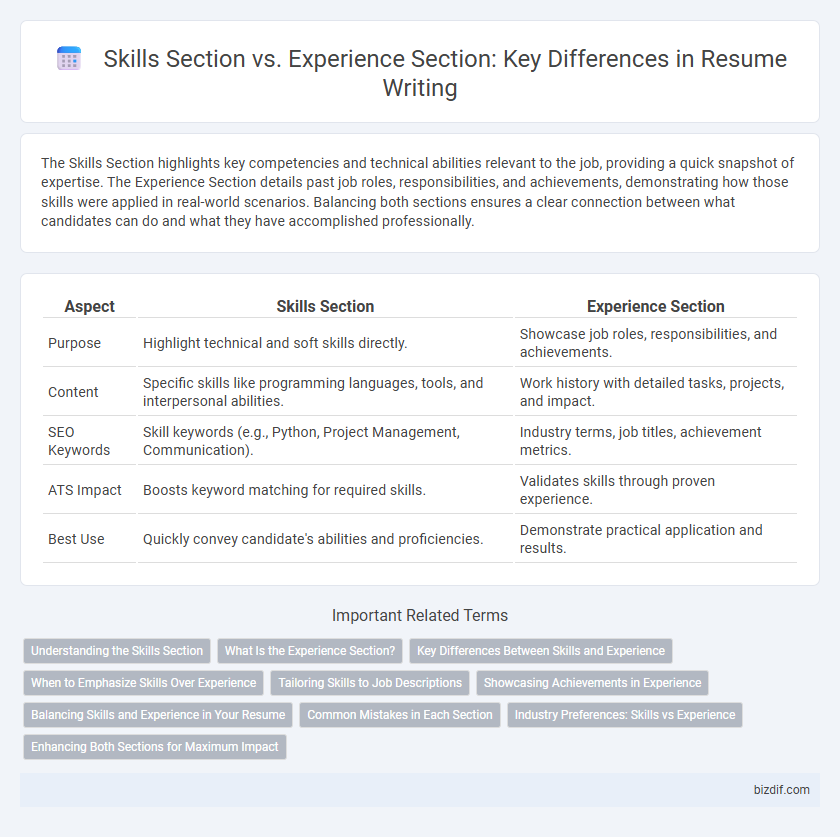The Skills Section highlights key competencies and technical abilities relevant to the job, providing a quick snapshot of expertise. The Experience Section details past job roles, responsibilities, and achievements, demonstrating how those skills were applied in real-world scenarios. Balancing both sections ensures a clear connection between what candidates can do and what they have accomplished professionally.
Table of Comparison
| Aspect | Skills Section | Experience Section |
|---|---|---|
| Purpose | Highlight technical and soft skills directly. | Showcase job roles, responsibilities, and achievements. |
| Content | Specific skills like programming languages, tools, and interpersonal abilities. | Work history with detailed tasks, projects, and impact. |
| SEO Keywords | Skill keywords (e.g., Python, Project Management, Communication). | Industry terms, job titles, achievement metrics. |
| ATS Impact | Boosts keyword matching for required skills. | Validates skills through proven experience. |
| Best Use | Quickly convey candidate's abilities and proficiencies. | Demonstrate practical application and results. |
Understanding the Skills Section
The Skills Section in a resume highlights specific abilities and technical proficiencies directly relevant to the job description, enabling recruiters to quickly assess a candidate's qualifications. Unlike the Experience Section, which details job responsibilities and accomplishments, the Skills Section offers a concise snapshot of competencies such as software expertise, languages, and certifications. Prioritizing industry-specific keywords and measurable skills in this section enhances applicant tracking system (ATS) compatibility and improves the chances of passing initial resume screenings.
What Is the Experience Section?
The Experience Section in a resume highlights your professional history by detailing your previous job titles, employers, dates of employment, and key responsibilities or achievements. This section provides concrete evidence of your skills through real-world application, demonstrating your ability to perform tasks and succeed in specific roles. Recruiters prioritize the Experience Section to assess your relevant industry experience and track record of accomplishments.
Key Differences Between Skills and Experience
The Skills Section highlights specific abilities and technical proficiencies, such as programming languages, software tools, or communication competencies, that demonstrate a candidate's qualifications. The Experience Section details past job roles, responsibilities, and achievements, showcasing practical application of skills and professional growth over time. Skills provide a snapshot of expertise, while experience offers context and evidence of how those skills are utilized effectively in real-world scenarios.
When to Emphasize Skills Over Experience
Highlight skills over experience when applying for entry-level roles or career changes where direct job history is limited. Emphasizing relevant skills like communication, problem-solving, and technical abilities helps recruiters quickly identify your qualifications. This approach is crucial for applicant tracking systems that scan resumes for specific keywords before reviewing detailed work experience.
Tailoring Skills to Job Descriptions
Tailoring the Skills section to closely match the keywords and requirements from the job description enhances resume screening by applicant tracking systems (ATS). The Experience section should demonstrate practical application of these tailored skills through quantifiable achievements and relevant job responsibilities. Aligning both sections increases the chances of passing automated filters and capturing recruiters' attention effectively.
Showcasing Achievements in Experience
The Experience section allows for a detailed presentation of accomplishments demonstrating real-world impact and measurable results, such as increased sales, project completions, or process improvements. Unlike the Skills section, which lists capabilities, the Experience section contextualizes these abilities through specific achievements that validate expertise. Highlighting quantifiable successes in the Experience section enhances a resume's effectiveness by providing evidence of value to potential employers.
Balancing Skills and Experience in Your Resume
Highlighting a balance between the Skills section and the Experience section in your resume enhances your candidacy by showcasing both your technical proficiencies and practical application. Emphasize key skills relevant to the job in the Skills section while providing concrete examples of these skills in action within the Experience section. This strategic alignment ensures recruiters can quickly match your capabilities with the role's requirements, improving your chances of passing automated applicant tracking systems and making a strong impression.
Common Mistakes in Each Section
In resume writing, common mistakes in the Skills section include listing generic or irrelevant skills without showcasing proficiency or impact, which diminishes clarity for recruiters. The Experience section errors often involve vague job descriptions and failing to quantify achievements, leading to underwhelming portrayals of professional capabilities. Optimizing both sections with specific, measurable, and relevant information enhances the overall effectiveness of a resume.
Industry Preferences: Skills vs Experience
Industry preferences for resume sections vary; technical fields like IT and engineering prioritize a well-defined Skills Section highlighting specific programming languages, tools, and certifications, while sectors such as finance and healthcare emphasize the Experience Section to demonstrate practical application and achievements. Employers in creative industries often seek a balance, combining both skills and experience to assess versatility and expertise. Tailoring the resume to align with industry expectations by showcasing relevant skills or detailed professional history enhances the chances of passing applicant tracking systems and attracting recruiter attention.
Enhancing Both Sections for Maximum Impact
Crafting a resume that strategically balances the Skills Section and Experience Section significantly elevates its effectiveness in capturing recruiters' attention. Highlighting relevant technical and soft skills in the Skills Section provides quick insights into your qualifications, while showcasing concrete accomplishments and responsibilities in the Experience Section demonstrates practical application and expertise. Aligning keywords from job descriptions across both sections improves Applicant Tracking System (ATS) compatibility, enhancing the chances of advancing to interviews.
Skills Section vs Experience Section Infographic

 bizdif.com
bizdif.com